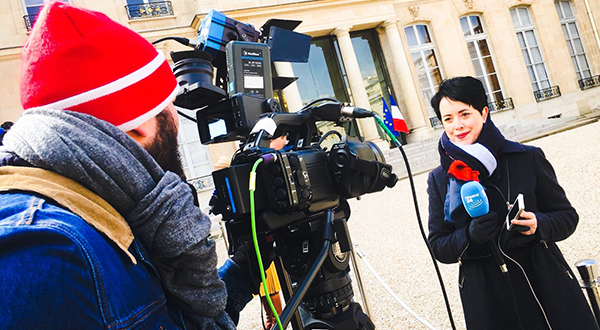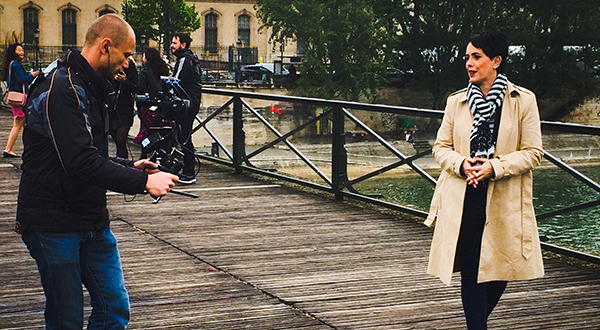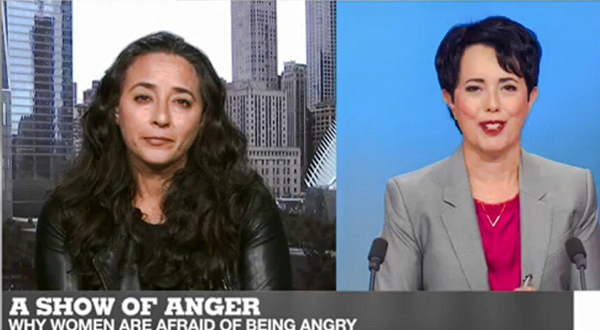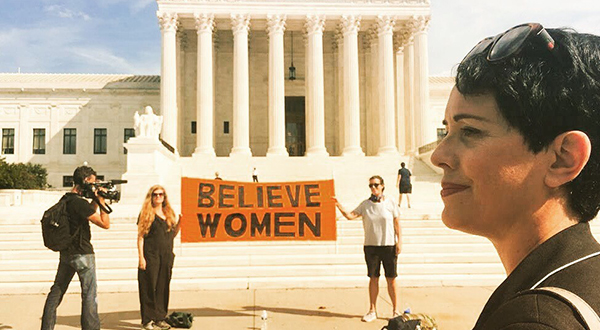30 November 2018

Annette Young
Journalist & Presenter, France 24 International News
Co-Founder & Host, The 51 Percent
Bachelor of Arts (Journalism)
Both curious and passionate, Annette is a journalist who has simultaneously fitted in and stood out, thriving in the media industry. Originally from Adelaide and now based in Paris, Annette has reported all over the world from parts of Europe, the Middle East and Asia.
In an extensive career, she has worked for the Melbourne Age, the Sydney Morning Herald and SBS Television Australia. While based in the Middle East, she became a Jerusalem correspondent for France 24.
Her experience includes covering a wide range of international news and affairs, including historic events such as the death of Palestinian leader, Yasser Arafat, Israel’s withdrawal from Gaza, and the Gaza war in 2008. Since returning to Paris in 2010, she has also interviewed a range of figures for France 24 from world leaders to Hollywood actors.
Annette has also always been determined to make a difference to gender equality. She created and hosts “The 51 Percent” – a France 24 show that challenges the status quo and social norms through reflections on women who are reshaping our world.
In 2015, recognising her achievements, Annette was named by UN Women as one of the 20 inspirational global voices on women in the media, and just this November was awarded another accolade from the UN Correspondents Association (UNCA).
Annette Young, along with her France 24 colleague Virginie Herz, won the joint gold medal in The Ricardo Ortega Memorial Prize for broadcast media for their special earlier in the year on the rising number of U.N. female peacekeepers.
The 23rd annual UNCA Awards will take place in New York on December 3 with guest of honour, UN Secretary-General António Guterres, 2018 UNCA Global Citizen of the Year Award Amal Clooney, and 2018 UNCA Global Advocate of the Year Award Adrian Grenier.
Not letting her many accolades slow her down though, Annette recently spoke about her professional journey and her relationship with France and Australia as an expat, while in the US covering the political chaos, historic midterms and Kavanagh hearings.

Could you tell us more about your background? What made you choose journalism as a career option?
When I was 14, my school sent us home with a career guidance questionnaire. I remember asking my late father what he thought I should do and he replied with a smile: “Well, you’re good at English, you always pinch the newspaper off me in the morning and most importantly, are very nosy, so why not be become a journalist.” His best friend, John, was a journalist with the Guardian in the U.K. and I suspect Dad was always envious of John’s life.
But Dad was completely spot on with his suggestion and now, all these years on, I can’t even contemplate doing anything else which says a lot about the level of job satisfaction. I completed my journalism degree at the University of South Australia, ended up with a cadetship at the Melbourne Age, and did a stint in Canberra with them before joining the Sydney Morning Herald. After six years at the SMH, I made the switch to television and joined SBS Television where I worked first for World News before joining Dateline as a producer.
What do you remember from your time at UniSA, has it informed your career in any way?
My journalism degree served as an essential tool in helping to get my career started. Having said that, I was the first graduate cadet at the Melbourne Age to be hired with a journalism degree since at that time, there was a degree of cynicism about the quality of such courses. That of course, has long disappeared, as UniSA journalism graduates (along with other journalism graduates) have proved their mettle. My bosses also quickly realised the course had provided a strong practical element which meant I knew how to write and report.
I would strongly encourage anybody wanting to pursue a career in journalism to do either an undergraduate, or these days, even better still, a post-graduate journalism course.
I also have very fond memories of my time at Magill; through its work attachments, I made valuable contacts with people in the industry. More importantly, I made wonderful friendships that have lasted to this day. Our family also has a strong connection to UniSA with my late father lecturing in architecture when it was SAIT and my niece completing her degree in medical radiation science at the City East campus.
Why did you choose to leave Australia and work in Paris?
My mother was French and from Paris and so it’s not a completely random choice but in 2000, my then- French partner wanted to return to Paris and I followed him. During those three years in Paris, I started working for Agence France Presse. My first years in Paris were tough; my French language skills were far from great and for foreigners who live here, it can be far from easy. The culture was not then particularly foreigner-friendly; not to mention, the bureaucracy, and the long cold and gloomy winters. It was so difficult that I decided to head to the Middle East (yes, you read this right!).
A few years on, I ended up working as a Middle East correspondent for France 24 English but by 2010, I had was ready to swap hummus for foie gras again. Since then, I’ve been working as a news presenter for the network. In 2013, I created the program that I now host, “The 51 Percent,” which is about how women are reshaping our world.

What has been the most rewarding aspect of being a journalist and presenter?
On our first day at journalism school, a lecturer told us that for those who are natural journalists will find that “newspaper ink gets into your blood.” He was right; it does except of course, back then, newspapers had not been decimated by the digital revolution. Still, the sentiment of what he said was so true.
It’s more of a lifestyle choice than anything else. I sometimes joke that it’s like signing up for a religious order with the long hours, the shift work, the stress, the low pay (I’ve watched my friends in other professions zoom past me financially a long time ago). But this is still over-shadowed by the professional joy I still receive. I’ve interviewed people from all layers of society be they world leaders, Hollywood actors, West Bank settlers or Palestinian militants, through to poverty-stricken parents in a village in southern Laos determined to carve out a better life for their children or a Bangladeshi trade unionist who took on the global garment industry and vastly improved working conditions for her fellow female workers. Dad was right; I am very curious by nature and always wanted to know what made people tick. We journalists are given a rare, privileged access to people’s lives. For that alone, I am truly grateful.
There have been difficult times too. In the course of my career, I’ve covered war, an intifada, and violent protests. I was on-air hosting the France 24 news during the shootings at the kosher supermarket in Paris in January 2015 and then incidentally, on-air again in November 2015 as news started coming through of the terrorist attacks being carried out at a number of Paris restaurants, the Bataclan theatre and the Stade de France. We didn’t know it at the time but one of those killed at the Bataclan was a studio technician who had just ended his shift at France 24 and was walking out of the studio as I walked in to begin mine. As I get older, reporting or covering violence for me has become tougher. The professional distance that you use to keep a level head, starts to shrink. You begin to understand and appreciate just how fragile life is.
But no doubt, creating “The 51 Percent,” has been among the most personally and professional rewarding times of my life. I’ve met wonderful women and men along the way since we began the show. Giving a platform for my guests’ views on the need for equality in all aspects of life is something I feel very strongly about.
Where did you get the idea to create TV program The 51 Percent? What’s your vision for the program? I created the program along with a French colleague in 2013. As senior journalists, we both passionately believed about the need for a different take on the news. A take reflecting that women do indeed make up 51 percent of the population but are still way behind, even in the most open of societies, in terms of being represented in all fields. Just thinking about the gender pay gap, or the extremely low number of senior female politicians and CEOs in Australia, for example.
I like to think it’s our job to make the unfamiliar, familiar; to challenge those cultural biases that we all have. Everybody stands to benefit from equality. The beauty of working for a global broadcaster is that we can look at all parts of the world and report on a wide variety of stories. France 24’s Arabic and Spanish networks also now have their own versions of our show.
The world is not only confronting a digital revolution but a gender revolution also. It will be just as transformative. Take a look at how much has changed in the last 50 years for women; not to mention, the last 12 months with the #MeToo movement. Still, we have a very long way to go before true equality is reached.

How do you find the experience of working in Paris? Does it match your expectations?
Thanks to my Parisian mother, I’m probably not your classic Australian expat (the irony in that less than a few kilometres from where I work, my great-grandparents, grandparents, great-uncles and aunts, and cousins are buried in a family crypt) but Paris has challenged me in many ways. Of course, to the bulk of the world, it’s a stunningly beautiful city to visit with its superb architecture, history and culture. But people forget it is also a real, living city too with all the inherent problems of a large metropolis.
Despite its rigid adherence to tradition, Paris, and France, has changed since I first came here in 2000. More and more young people have lived, travelled or studied abroad. They have experienced other cultures and in Paris, English is much more widely spoken than when I first arrived, which itself is an important sign. For instance, when I first came, there was barely a vegetarian restaurant to be found; organic food was to be scoffed at; the idea of a gap year for students was unheard of; and as for decent coffee, well, forget that!
This has all changed and there is now an English-speaking president who understands the need for France to move forward and embrace change, as opposed to outright rejecting it. Not to mention, a determined group of Australian baristas and cafe owners and their ever-growing number of French fans who love their “flat whites.”
I always say to any Australian contemplating a life abroad, “just do it.” There will be crappy periods as there will be very happy times. But the experience adds an incomparable richness to your life that cannot be measured on a CV. Your life-coping skills will be majorly enhanced; you understand that your own culture’s way of doing things is not the only way and maybe, not necessarily the best.
What do you miss most about Australia?
Where do I start?! The weather; our unique sense-of-humour; the glorious food; the coffee; our diverse society (although sadly, that is still not reflected in the media, political representation or other positions of leadership as much as it should) and the sheer beauty of its landscape. I miss how even when your eyes are firmly closed, the searing sunshine still penetrates through. Or the scent of eucalyptus that I always inhale as I step outside the airport terminal when I go home. “Home.” There you have it, the fact I still call it home says so much.
What’s your favourite way to spend a day in Paris?
I would head to the Marais, particularly the Northern Marais (or NoMa, as some jokingly call it). It was one area that was not razed during the 19th century by the master urban planner, Baron Haussmann and many of its medieval buildings still remain. Walk through its streets, have brunch at “Fragments” cafe, visit the Picasso Museum; walk along the rue de Bretagne and then wind your way south. Head to the Musee Carnavalet which gives you a wonderful taste of the city’s art and social history. Then walk towards rue Vielle du Temple and all of its shops. From there, head to the River Seine, and enjoy an “apero” at one of the many bars nearby. For dinner, I’m currently a big fan of “Ellsworth” restaurant which is in the first arrondissement and a wonderful example of fusion cooking at its best.
To read the original interview on Advance visit: http://bit.ly/2yyvCVv.




